You are here: American University Provost Office of Global and Immersive Studies Washington Semester Program Student Ambassador Blog Justin Vetterl
Contact Us
Washington Semester Program on a map
Washington Semester Program 4801 Mass Ave, NW, 4th Floor Washington, DC 20016 United States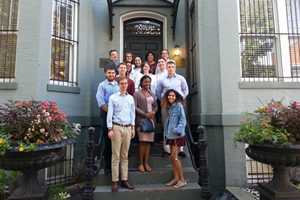
Justin Vetterl Foreign Policy
October 23 | There have been countless opportunities to explore the sights and sounds, but the Washington Semester Program has also provided great classes and professors. I'm a part of the Foreign Policy concentration, and my classmates, professor, and the events that we have partaken in have been wonderful. There is much emphasis on experiential learning and using the location of Washington, DC, to gather expertise and different learning environments, more than anything I've had the chance to experience before.
Beyond my internship experiences, the Washington Semester Program has provided an amazing experience through the seminar. My Foreign Policy professor is one of the best professors I've had throughout my college experience. In the seminar, there has been a keen focus on foreign policy schools of thought and lessons focused on the importance of how American foreign policy impacts the world stage. Our professor has done an excellent job in providing a foundation of the material while using the unique opportunities throughout DC to meet with experts and explore self-reflection-based lessons provided by many museums.
For example, we have had the unique opportunity to meet with guest speakers from the United States Foreign Service Association, National Press Club, the Cato Institute, the Heritage Foundation, and World Service Authority to discuss foreign policy perspectives and the influence different institutions have had the implementation of foreign policy. Every speaker we had was unique and professional and provided potential networking opportunities for students interested in their respective fields. Each experience our class has been able to partake in has greatly enhanced my own understanding of different perspectives as well as how foreign policy is created and implemented effectively through different actors.
Most of the guest speakers we had early in the semester represented their distinct foreign policy school of thought. This gave us the opportunity to view our initial understanding from the lectures and readings across a spectrum of policy decisions and debates. It was very interesting listening to how each speaker was able to make strong arguments for their respective school of thought and tell insightful stories of how some of their policy initiatives have gone over the years. The point of all this was to give everyone in the class an opportunity to identify many of the key arguments in a spectrum of practical policy. This led to an in-class debate with students breaking into groups to support the different perspectives and challenge the flaws within each school of thought. In the debate we essentially used each of the schools of thought and saw how they held up under the scrutiny of our peers, and it was immensely fun.
Another aspect of our experiential learning has been our visits to the Latin American Conference dealing with corruption and our trips to the Newseum and the National Museum of African American History and Culture. In particular, with our visit to National Museum of African American History and Culture, there was a deep sense of historical legacy and the importance of remembering some of the worst parts of American history. I took my time working through the historical section of the museum and loved the subtle touches in the design of the museum. This includes how you start from the dark bottom floor in slavery's origins and slowly work upward toward a more prosperous future. Through this journey, I was able to see many fascinating stories and the remarkable growth in civil rights with the understanding that more is still needed for greater progress.
I was drawn in by the attention given to the history of African Americans in the Armed Forces and many of the challenges they had to overcome before and after Executive Order 9981, which integrated the military. The Civil War section highlighted the challenges of black soldiers who were underpaid and largely relegated to labor-related jobs. The museum did a great job of highlighting the point that the military remained segregated through the Second World War. I personally liked the display of the Harlem Hell fighters of the First World War, who fought directly under French command because General Pershing did not want to intermix his troops.
For World War II, there was an excellent emphasis placed on the Tuskegee Airmen. It all started when thirteen African American men volunteered for the first flight-training program at the Tuskegee Institute, and many more who followed were determined to serve their country and show skeptical military leaders that African Americans could be top fighter pilots. Graduates eventually joined the 332nd Fighter Group under Col. Benjamin O. Davis Jr. They gained special recognition for their record of safely escorting bombers on their missions. The airmen permanently put to rest any doubts about the abilities of African American pilots, and their aircraft with the symbolic 'red trail' inspired many bomber pilots they escorted. The Tuskegee Airmen were awarded over 150 Distinguished Flying Crosses for their achievements and were just one example of how exemplary service helped impact the decision to integrate. The museum even had a refurbished Stearman Kaydet training aircraft above the exhibition, which had been used to pass flight tests administered by the War Department.
 One extremely cool moment during my visit was seeing retired General Colin Powell's uniform on display in the military culture section. This uniform was worn during his tenure as the first and thus far only African American to serve on the Joint Chiefs of Staff. Powell was a trailblazer in his own right, serving as the 16th National Security Advisor, 12th Chairman of the Joint Chiefs of Staff, and 65th Secretary of State. He was the first African American Secretary of State and responsible for the creation of the Powell Doctrine in foreign policy, which outlined when military action would be taken by the United States and was notable for its emphasis on exhausting all political, economic, and diplomatic means before engaging in warfare. Powell formed this foreign policy based on his own experience in Vietnam. He had been an advisor there and was wounded by a punji stake and later rescued three men from a helicopter crash. He is a self-proclaimed realist who was called 'the reluctant warrior,' and he oversaw what many would consider a series of successful American interventions and foreign policy during the 1990s.
One extremely cool moment during my visit was seeing retired General Colin Powell's uniform on display in the military culture section. This uniform was worn during his tenure as the first and thus far only African American to serve on the Joint Chiefs of Staff. Powell was a trailblazer in his own right, serving as the 16th National Security Advisor, 12th Chairman of the Joint Chiefs of Staff, and 65th Secretary of State. He was the first African American Secretary of State and responsible for the creation of the Powell Doctrine in foreign policy, which outlined when military action would be taken by the United States and was notable for its emphasis on exhausting all political, economic, and diplomatic means before engaging in warfare. Powell formed this foreign policy based on his own experience in Vietnam. He had been an advisor there and was wounded by a punji stake and later rescued three men from a helicopter crash. He is a self-proclaimed realist who was called 'the reluctant warrior,' and he oversaw what many would consider a series of successful American interventions and foreign policy during the 1990s.
My time at the museum was both fun and engaging. It was very professional in its delivery and commemorations of many lesser-known aspects of African American history. I've studied the subject matter before and appreciated going deeper at the museum. It will be interesting to see how history reflects on us in the future.
Blog History
October 9

Justin Vetterl Foreign Policy
October 9 | With midterms fast approaching, it's hard to believe that I've already been in Washington D.C. for five weeks. The structure of my Washington Semester Program (WSP) experience consists of an internship three days per week and seminars on the other two days. I knew coming to Washington, D.C., after graduating from Marine Officer Candidate School was going to be a challenge. I did not have a traditional summer to prepare for an internship search because I had extremely limited time and access to technology during my training, which left me feeling unsure of how the process was going to go. I was truly hoping that I could have a quick turnaround when it came to applying to internships and that it would be easy to find the 'perfect fit.' I was very interested in working at an intelligence-based firm to better prepare me for my interests in the Marine Corps and thought to myself 'What better place to find such a firm than in the heart of our country's policymaking machine?'
Looking back, if there was anything I would have liked to have done differently, it would simply have been allowing myself more time to search and apply. Thankfully, WSP affords students who need it the time to search. I was very grateful for the allotted time and for the resources that American University provided for my search. Early on I was able to attend a few workshops on interviewing and resume building that went a long way in my successful applications. The single best resource for me was the Internship Fair that American University's School of Professional & Extended Studies hosted. It was there that firms with time-sensitive internship openings were able to connect with students and provide a diverse set of opportunities for students to reach out in a professional environment. I applied for many internships that I learned about at the fair, and I am now interning as a part of an organization that I was introduced to there.
The interview process was a very interesting phase for me. On one hand, I was excited to interview to gain professional development experience, while simultaneously I was worried that I wasn't going to be able to land any of the jobs. Fortunately, every internship I applied for wanted an interview, and if one thing is for certain, my time with the Marines increased my self-confidence and reassured me that if I put my mind to something, I can achieve it.
In total, I conducted four interviews, almost all of which were in person. Some of the interviews were by phone, while others were done in person at the office locations. Though convenient, phone interviews felt less professional and far less personable to me than those conducted in person. In particular, when I had to go in person, I appreciated the extra effort required from both me as a candidate and of the interviewer who was taking direct time to meet with me. Overall, I had great success with every interview, and I found that balancing work-related experiences, which would include prior research I've conducted, when combined with personal stories of why the position mattered to me was most effective. I was able to be both professional and personable, demonstrating what I could bring to the position and how the position would help develop me for the future, something that I believe the interviewers appreciated.
 In the end, every internship I applied for ended up giving me the position. The challenge was truly in selecting one option while remaining professional with the others. I started by narrowing down my choice to two distinct institutions out of the interview process. It certainly left me very torn on exactly which I wanted to do, as both are great institutions and would have developed me in unique ways. In the end, I chose the Truman National Security Project after directly meeting with the supervisor of the program in which I was interested.
In the end, every internship I applied for ended up giving me the position. The challenge was truly in selecting one option while remaining professional with the others. I started by narrowing down my choice to two distinct institutions out of the interview process. It certainly left me very torn on exactly which I wanted to do, as both are great institutions and would have developed me in unique ways. In the end, I chose the Truman National Security Project after directly meeting with the supervisor of the program in which I was interested.
The Truman National Security Project seeks to progress and resolve complex challenges in American foreign and domestic policy through a utilization of all of America's unique hard and soft power capabilities to lead toward a safer, more prosperous world. This means identifying the 21st-century frontlines, securing the American middle class as an engine of economic power, creating strong and resilient communities that ensure domestic security, and creating strategic leaders for a changing world. These goals are pushed forward by Truman's 4-D approach that includes: Defense and Intelligence, Diplomacy and Alliances, Development and Trade, and Democracy and the Rule of Law. The supervisor I met with was both personable about what he was doing in the training department and knowledgeable on how the work experience of the internship would translate into practical experience for my own interests. It does help that he is also a former Marine, but it was seeing how building training modules based on policy research could help develop my leadership skills, knowledge, and ability that won the day. The personal goals that my supervisor has set for me will have far more value than doing standard policy research alone. Truman will also greatly expand my networking capability further through the presentations that I will be a part of and the training that I hope to certify in.
For future students, when it comes to the internship search, my greatest advice is to start early. You won't really know what you want to do until you start searching and interviewing with prospective firms, and you don't want to make a hasty decision. Even if you have your mind set on a specific internship, look at other competitors, too, as a potentially better position may be available or you may find another firm has a better fit or opportunities. Personally, I want to achieve greater confidence in public speaking and presenting of intelligence. Working with Truman, that is exactly what I am doing, with the added benefit of learning some great material and how to construct a professional training module on policy matters. I will push myself to achieve the lofty goals set by my internship and that I can apply the lessons learned to my future career.
October 2

Justin Vetterl Foreign Policy
October 2 | The last few weeks here in Washington, DC, have been an absolute blast. Everywhere I look there are new experiences to have and a gallery of new friends to make. Every weekend I have made it a mission to go out to one of the many memorials or museums scattered throughout DC. For example, I spent a lot of time visiting the Vietnam Memorial and appreciating what the memorial truly means for those who died in the war. Memorials in general always leave a great impression on me and are a truly unique experience that Washington, DC, provides.
 When you first walk next to the reflecting pool, you cannot help but be amazed at the grandeur that is the Lincoln Memorial. Perhaps the most spectacular monument in DC, it is awe-inspiring in its sense of scale and intricate detail. You can easily see how great ancient structures like the Athenian Parthenon were used as inspiration in its architecture and symbolic meaning for the preservation of the republic. It was a great feeling walking up the steps, seeing Lincoln's statue, and reading the inspirational speeches etched onto the inner walls.
When you first walk next to the reflecting pool, you cannot help but be amazed at the grandeur that is the Lincoln Memorial. Perhaps the most spectacular monument in DC, it is awe-inspiring in its sense of scale and intricate detail. You can easily see how great ancient structures like the Athenian Parthenon were used as inspiration in its architecture and symbolic meaning for the preservation of the republic. It was a great feeling walking up the steps, seeing Lincoln's statue, and reading the inspirational speeches etched onto the inner walls.
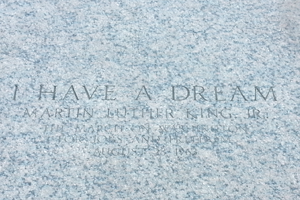 Yet what stood out to me most was observing a small dedication to Martin Luther King, Jr. Indeed, you can stand exactly where he stood when he gave his 'I Have a Dream' speech. I stood looking at the cascading stairway and over the stoic nature of the reflection pool, looking off into the distance where the Capital stands.
Yet what stood out to me most was observing a small dedication to Martin Luther King, Jr. Indeed, you can stand exactly where he stood when he gave his 'I Have a Dream' speech. I stood looking at the cascading stairway and over the stoic nature of the reflection pool, looking off into the distance where the Capital stands.
Following my time at the Lincoln Memorial, I made my way to the beautifully done Korean War Memorial. Similar to the Vietnam memorial, there is an aura that surrounds the memorial. I particularly appreciated the dedications to all of the United Nations countries that took part in the coalition, and the notion that the memorial was not afraid to show the facts of the war. It was certainly another opportunity to look back and reflect on what is widely considered a forgotten war, when in reality the sacrifices made during the conflict can never be forgotten. With my visit to both the Vietnam and Korean War memorials, it was only suitable that I continued my appreciation by visiting the both of the World War memorials.
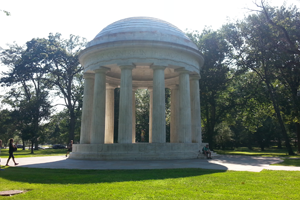 Something I was quite surprised about was the disparity between the two Great War memorials. In particular, I did not expect how quiet the World War I memorial was in comparison to all of the other memorials I've visited. It's a bit off the beaten path and dedicates its memory to the service members of the District of Columbia with the etchings of those who died around its base. It is small and secluded, surprising given the scale of World War I, but when I took the time to sit down near it and simply observe, I noticed something very special about it. It was certainly peaceful, with birds chirping in the warm August air and a breeze blowing through the trees. It was a welcome change in pace.
Something I was quite surprised about was the disparity between the two Great War memorials. In particular, I did not expect how quiet the World War I memorial was in comparison to all of the other memorials I've visited. It's a bit off the beaten path and dedicates its memory to the service members of the District of Columbia with the etchings of those who died around its base. It is small and secluded, surprising given the scale of World War I, but when I took the time to sit down near it and simply observe, I noticed something very special about it. It was certainly peaceful, with birds chirping in the warm August air and a breeze blowing through the trees. It was a welcome change in pace.
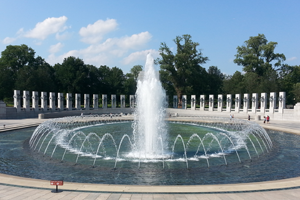 In contrast, something that is quite well done about the World War II Memorial is both its sense of scale and its intricate detail when you look closely. I loved that it had two archways representing both the European and Pacific theatres of war and that at the base of each were a list of battles and operations. The display of wreaths in a ring around the site pays attention to every state and territory that was a part of the United States during the war, and a wall of stars represents all who were lost. It's a spectacular thing to see and an amazing dedication.
In contrast, something that is quite well done about the World War II Memorial is both its sense of scale and its intricate detail when you look closely. I loved that it had two archways representing both the European and Pacific theatres of war and that at the base of each were a list of battles and operations. The display of wreaths in a ring around the site pays attention to every state and territory that was a part of the United States during the war, and a wall of stars represents all who were lost. It's a spectacular thing to see and an amazing dedication.
For me understanding history allows us to honor the sacrifices made for progress, defense, and greater opportunity. Knowing where we come from will influences our future decision-making. We must make our own history by being respectful of and understanding the past. In particular, understanding the history of the sacrifices associated with war has greatly impacted my experience as a foreign policy student in the Washington Semester Program. We have spent many sessions discussing schools of thought in terms of both realism and idealism. Knowing the history of different case studies truly allows a greater understanding and analysis of American foreign policy and how decisions are made. There is a greater meaning when discussing the cost of war and difficulties of deciding whether to intervene. Whether you consider the Holocaust and Rwanda or the Korean and Vietnam Wars, there were great consequences to decisions based on American foreign policy. Understanding the facts, debates, and loss of life makes visiting memorials surreal. The Washington Semester Program has thankfully given me the opportunity to reflect on how policy is formed and the great consequences those decisions have on the world.
September 18
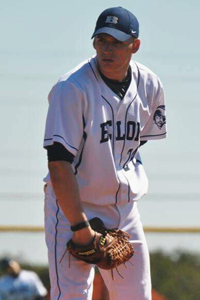
Justin Vetterl Foreign Policy
September 18 | My name is Justin Vetterl. I'm a senior from Beloit College double majoring in Political Science and History. My summer and fall semesters will be far from ordinary. Not only do I have the opportunity of a lifetime to study in Washington, DC this semester, I also get to develop the skills and life lessons that I've learned from the Marine Corps.
It's hard to believe that it has already been a month since I graduated from Officer Candidate School (OCS) in Quantico, Virginia. It was there that I trained for 10 weeks to earn the title of Marine, and it's ultimately my goal to become a Commissioned Officer in the United States Marine Corps. The experiences of OCS have instilled in me many key principles and traits that I live my life by, including justice, judgement, dependability, initiative, decisiveness, tact, integrity, enthusiasm, bearing, unselfishness, courage, knowledge, loyalty, and endurance.
The greatest challenges that I now must face are adapting back into normal civilian life and gaining familiarity with the environment of Washington, DC. However, I can certainly say that American University has been an amazing experience. I first learned about the Washington Semester Program (WSP) from my history advisor, who herself had gone through the program. Doing a study abroad experience was always something I had wanted to do, but there was always a concern for my ability to afford such an experience, and there was always the comfort of staying in Beloit.
While staying in Beloit for all of my senior year would have been the easy route, going forth with ambition and challenging your comfort zone is central to developing what defines you.
Another principle that the Marine Corps engrained in me was to know yourself and seek self-improvement. This can apply to anyone, and in the case of a study away program, it was taking the leap to challenge myself to try something new. The WSP program and its collaboration with Beloit's Liberal Arts in Practice Center made this opportunity a possibility. I have used every day in Washington to try new experiences. Being a part of the Foreign Policy concentration, unique opportunities are often only a few days apart. My first day in Washington was only a week after I had graduated from OCS, and I spent it exploring historical Georgetown and the National Mall.
 It was at the Vietnam Memorial that I got my first set of chills, not only from the sight of the names of those who gave their lives, but from the countless veterans and families who were there that day. At the Vietnam Memorial I took the time to look up someone that was honored at OCS. John Paul Bobo was a 2nd Lieutenant of Company I, 3rd Battalion, 9th Marines. Lt. Bobo was killed in Vietnam on March 30, 1967 in an assault in the Quang Tri Province Hill 70. As a 24-year-old weapons platoon commander in midst of an ambush, Lt. Bobo created a hasty defense of the company command post, preventing it from being overrun. It was during this heroism that Lt. Bobo was struck by a North Vietnamese Army mortar, severing his right leg. Navy Corpsman Kenneth Braun witnessed the scene and provided aid to Bobo, who, despite being severely wounded, refused to be evacuated and instead propped himself up against a tree and continued to fight while encouraging his Marines until he succumbed to his wounds. Because of Lt. Bobo's leadership, courage, and initiative, the outpost held its ground, fully repulsing the attack, and he was posthumously awarded two Purple Hearts and the Congressional Medal of Honor for his actions.
It was at the Vietnam Memorial that I got my first set of chills, not only from the sight of the names of those who gave their lives, but from the countless veterans and families who were there that day. At the Vietnam Memorial I took the time to look up someone that was honored at OCS. John Paul Bobo was a 2nd Lieutenant of Company I, 3rd Battalion, 9th Marines. Lt. Bobo was killed in Vietnam on March 30, 1967 in an assault in the Quang Tri Province Hill 70. As a 24-year-old weapons platoon commander in midst of an ambush, Lt. Bobo created a hasty defense of the company command post, preventing it from being overrun. It was during this heroism that Lt. Bobo was struck by a North Vietnamese Army mortar, severing his right leg. Navy Corpsman Kenneth Braun witnessed the scene and provided aid to Bobo, who, despite being severely wounded, refused to be evacuated and instead propped himself up against a tree and continued to fight while encouraging his Marines until he succumbed to his wounds. Because of Lt. Bobo's leadership, courage, and initiative, the outpost held its ground, fully repulsing the attack, and he was posthumously awarded two Purple Hearts and the Congressional Medal of Honor for his actions.
Bobo had enlisted in the Marine Corps Reserve while attending Niagara University, and upon graduation he attended both Officer Candidate School and the Basic School in Quantico, Virginia. Those who served with Bobo in Vietnam referred to him as an exemplary young officer who cared for his Marines. Lt. Bobo's sacrifice is widely remembered today, with a United States Navy ship-class as well as the Mess Hall at Officers Candidate School being named in his honor. It was an honor and a privilege for me to look up a legendary Marine who exemplifies what it means to be a Marine Officer.
I get chills every time I visit the Vietnam Veterans Memorial; no matter who you are, it is truly sobering to see just how many lives were lost. John Paul Bobo's name can be found on the Vietnam Veterans Memorial, Panel 17E, Line 70.
